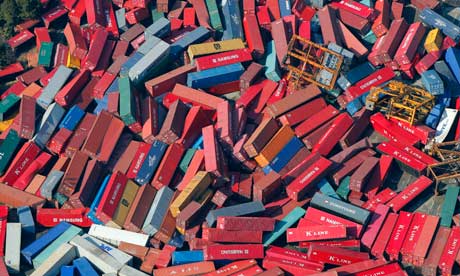Disasters in Australia, New Zealand, Japan and the US made the first half of 2011 the costliest six-month period in the insurance market's 323-year history

Cargo containers thrown around by the tsunami in Japan. Photograph: Itsuo Inouye/AP
Lloyd's of London is warning that the insurance industry faces an extremely challenging outlook as the world's oldest market slipped deep into the red following record claims from natural disasters. An unprecedented run of catastrophes in Australia, New Zealand, Japan and the US has led to insurers paying out billions of pounds this year. This made the first half of 2011 the costliest six-month period in the insurance market's 323-year history. Richard Ward, Lloyd's chief executive, said 2011 was shaping up to be the second-worst year on record for the insurance industry – after 2005, which saw Hurricane Katrina wreak havoc across the southern US. Others, including Lloyd's of London insurer Hiscox, believe this could easily be the most destructive year ever. "If we see more catastrophes come through it could well be [the second worst year ever]," said Ward. "Things will get more and more challenging. We're faced with a pretty dire economic environment. Everyone is talking about sovereign debt default and a double-dip recession. It doesn't make happy reading. The economic environment is, of course, affecting all our clients." This makes it harder for insurers to raise the cost of cover. Ward warned: "While interest rates are low and equity markets are volatile, we can't rely on investment income to subsidise our underwriting, we must decline under-priced risks." Lloyd's, which began in a coffee shop in the City of London in 1688, slumped to a pretax loss of £697m in the first half, against a profit of £628m a year ago, reflecting £6.7bn of claims.
While insurers have been lifting their premiums to protect against natural catastrophes in Australia, New Zealand, Japan and the US, Ward said that elsewhere rates are flat or even falling. "We do need to see rates go up to restore the industry to profitability," he reiterated. "But rates are going up from a low level – in 2005 the market was still reasonably hard and there were still profits in the system." The frequency and severity of natural disasters is making life hard for insurers. "It does feel as though [natural disasters] are happening a lot more frequently," Ward said, although he added that "you have to look over 100 years rather than just 10 years". "When these events happen everyone does revise their models. But I always say what worries me is the things we don't model," he said. Lloyd's revealed that it had minimised its exposure to some European government debt regarded as too risky, and was steadily pulling deposits from peripheral European banks. A spokeswoman explained that Lloyd's had no investments in Greece, and "minimal exposure" to Ireland, Portugal, Italy and Spain. Rather than rushing to withdraw deposits from certain banks, Lloyd's is shifting its portfolio towards more secure banks as term deposits mature. Lloyd's has an investment portfolio worth £50bn, with 38% allocated to corporate bonds, 28% to government bonds, 29% to cash and 1% to equities. Most of its government bonds are UK gilts and US Treasuries, which are seen as safe havens. Luke Savage, Lloyd's finance director, said: "Given the uncertainty around the eurozone, we would seek to reduce potential downside risk. As a result, we're not holding government debt of any peripheral EU countries and have sought to reduce our exposure to banks in these countries." Some 80% of Lloyd's corporate bond holdings are from financial institutions. Savage said Lloyd's was shifting its holdings towards high quality banks, perhaps with government backing, from single-A rated banks and peripheral European institutions. MEP Godfrey Bloom, UKIP's city spokesman, who sits on the economic and monetary affairs committee of the European parliament, said: "Lloyd's are only doing what they have to do. Their job is to ensure that money deposited with them is treated with full due diligence and care. Anything else than acting to protect these deposits by removing them from potential harm in risky countries would be a dereliction of their duty." The news comes a day after it emerged that German engineering group Siemens pulled its deposits out of Société Générale in July. At 113%, Lloyd's has a combined ratio – a key measure of an insurer's underwriting profitability where 100% and anything over indicates a loss – which compares favourably with the 117% recorded by its Bermuda-based rivals and 116% for US reinsurers, although European insurers and reinsurers have a lower ratio of 106%. Ward believes Lloyd's is benefiting from the diverse book of business that its members write – covering anything from natural disasters to kidnapping, fine art theft and space and satellite insurance.
No comments:
Post a Comment